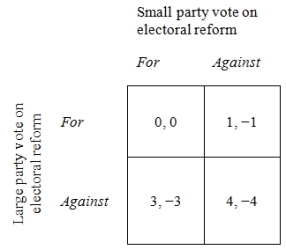Choosing Electoral Rules: A Game-Theoretic Approach
When would incumbent politicians be likely to abandon disproportional single-member district electoral laws in favor of a "fairer" proportional representation system (as occurred in New Zealand about a decade ago) ?
The following game can be used to explain the prospects for institutional reform in democracies. To keep things simple, we can think about the prospect for institutional reform (such as a change from single-member district plurality rule to proportional representation) as a game between a large party and a small party. They each must decide whether to vote for or against the proposed electoral reform. If the large party votes against reform, reform efforts fail and the next election is conducted under the existing rules.
Assume that voters prefer a more proportional electoral system. Thus, parties enjoy an electoral benefit if they vote for reform, but only if the other party votes against reform. Conversely, if a party votes against the reform, it pays a cost, but only if the other party votes for. Payoffs representing this electoral reform game are displayed in the following strategic-form game, where the large party's net electoral benefits from blocking reform are larger than the benefits the parties enjoy from being seen as lone reformers.
Figure 1. The Electoral Reform Game-Example 1

-If this were an accurate model of a particular country at a particular time, what would you predict about the behavior of the parties?
Definitions:
Q3: The CDC issues a statement saying that
Q13: Changes in buyer behaviour due to the
Q14: Which of the following statements is a
Q15: Robert Martinson (1974) concluded which of the
Q17: Which of the following is an example
Q18: Which of the following statements is true
Q19: If Figure 3 remained the same except
Q19: According to findings from meta-analyses, treatment programs
Q24: What is (are) the key difference(s) between
Q33: If the mixed system were "dependent," how